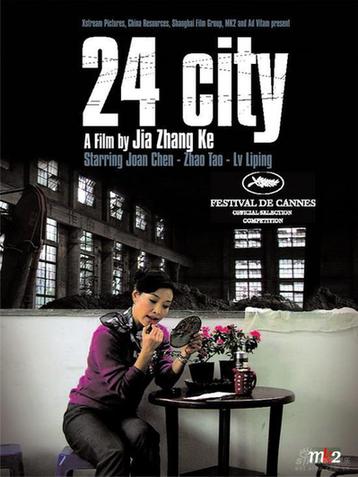"24 City" a moving elegy to modern-day China
(Agencies)
Updated: 2008-05-27 11:37
Updated: 2008-05-27 11:37

Documentary and fiction are sometimes uneasy bedfellows, but having made both back-to-back in many of his film projects (most recently, "Still Life" and "Dong"), Venice frequenter Jia Zhangke finally marries the two media in his Cannes competition debut, "24 City."
In his chronicle of the changing fortunes of a defunct but once glorious aeronautic factory and its workers through talking heads and wordless images exclusively, the documentary strain prevails to simple, yet emotionally reverberating effect.
It will be an amphibious item on the festival circuit, accepted both by arthouse and documentary or humanitarian events. Theatrical horizons probably cover European arthouse only.
Jia may have absorbed the aesthetics of Wang Bing's "West of the Tracks" and "Feng Ming" in his meditative interpretation of Chinese social history. Less ambitious than Wang, the film neither strains for unplumbed depths nor all-encompassing breadth. It is essentially a micro-vision of individuals of various ages, offering recollections or opinions either of their parents or their own that are related to the factory's past that deliberately sound improvised. Grander themes like historical turmoil, seismic shifts in economic and human infrastructures are in the periphery, but always informing these characters' destinies.
"24 City" also balances the human cost of change with a self-renewing future as witnessed by the re-development project on the demolished factory site. It also has a pure clarity and pristine cinematography that will appeal to a more serious and aesthetically inclined audience.
Even with big names like Joan Chen and Jia's regular leading lady Zhao Tao among the cast, their appearances blend inconspicuously with the other real life figures, and their stories prove just as human and universal. The relay from one scene or person to the next is completely natural. Images of faces, machinery and run-down factory interiors overlap, or fade in and out of each other like one inseparable entity - as is the personal and the political.
Jia's penchant for choosing pop songs or music that complement the era of his narrative is also seen in "24 City," but it is done more selectively, and thus has a more lingering effect.
The only thing might have added variety and richness to the film would be the inclusion of more dialogues or interactions with more than one person. As it were, the most touching scene involves a factor apprentice's reunion with his now elderly master after many years. Simmering internal turmoil is captured in one shot of the two stroking each others' wrinkled, roughened hands.
|
||
|
||
|
|
|
|